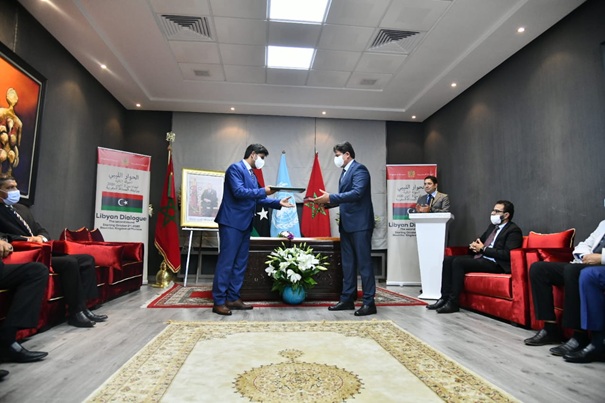
The delegations of the Libyan High Council of State and the House of Representatives participating in the second round of the inter-Libyan dialogue in Bouznika stressed, on Tuesday, 6 October 2020, that this round ended with comprehensive agreements on the criteria and mechanisms for filling sovereignty positions, provided for in Article 15 of the Libyan Political Agreement concluded in December 2015 in Skhirat.
The two delegations specified, in a final declaration issued at the end of this round, held from 02 to 06 October in the Kingdom, that “the outcome of the dialogue between the two delegations constitutes a contribution on which it is possible to capitalize, to establish stability in the country and put an end to the institutional division”.
In the final declaration read at a press conference by Driss Omran of the Libyan House of Representatives, in the presence of minister of Foreign Affairs, African Cooperation and Moroccan Expatriates, Nasser Bourita, both parties expressed “their determination to continue their consultative meetings, in the Kingdom of Morocco, in order to coordinate the action of political, executive and control institutions, thus ensuring the end of the transitional period”.
Aware of the importance of sovereign institutions in the management of the country and the preservation of the values of the Libyan people, the delegations stressed that “the dialogue sessions were marked by a spirit of national responsibility that gave priority to the general interest, with the aim of overcoming the current political division”.
The two delegations put at the disposal of the Libyan High Council of State and the House of Representatives the minutes of the agreements they reached during the 1st and 2nd rounds, in order to proceed with the measures of renewal of the structures of the sovereign institutions, stressed the declaration.
On this occasion, the same source added, both parties reiterate their thanks to the efforts of the Kingdom of Morocco “which have helped overcome the obstacles, in order to achieve real Libyan agreements, in harmony with the provisions of the Libyan Political Agreement”.
They also welcomed the “positive interaction” of the acting United Nations envoy to Libya, Stephanie Williams, who has worked to build complementarity between the various efforts of the dialogue, with a view to establishing a comprehensive political process.
The holding of the Berlin Conference last January was an international wager for the political resolution of the Libyan crisis, the two delegations added, noting, however, that the political process remains “awaiting clear and concrete support from the international community”.
